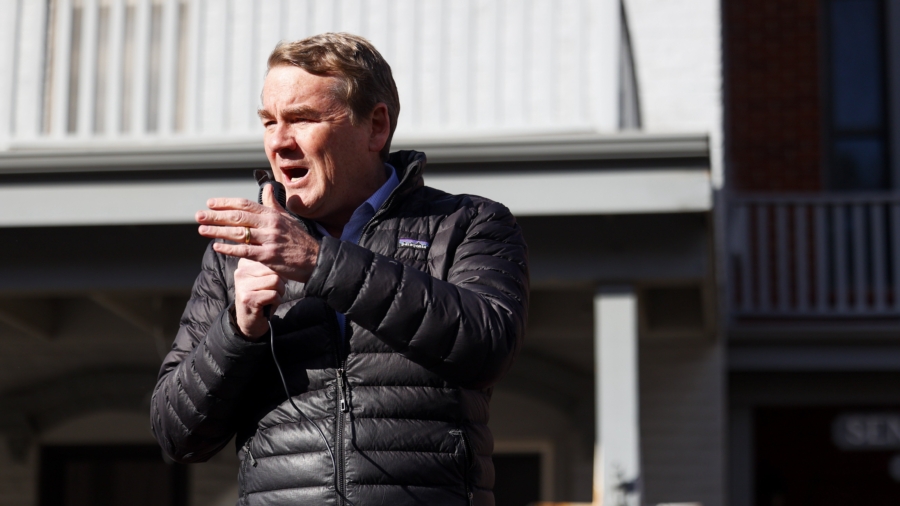Senator Michael Bennett (D-Colo.) has said he’d be willing to bring on a partial government shutdown if Congress does not approve new rounds of aid spending for Ukraine in the 2024 budget.
In an interview with NBC News’ ‘Meet the Press’ on Wednesday, Mr. Bennett said he would “be willing” to block a deal to fund the U.S. government if the deal doesn’t also include new spending to assist Ukrainian forces fighting on the ongoing war with Russia. The Colorado Democrat said a partial government shutdown may “be necessary, to make sure that we get people’s attention” on supporting Ukraine.
“I hope it doesn’t come to that, but if it does, I certainly will be willing to shut the government down over this issue,” Mr. Bennett told the network.
Funding for Ukraine has been a contentious issue throughout the 2024 budget process. The government was on track for a partial shutdown at the start of the new fiscal year on Oct. 1, but lawmakers managed to pass a short-term funding deal, known as a continuing resolution (CR), on Sept. 30. The CR, which provides government funding through Nov. 17, did not include specific funding for Ukraine.
Mr. Bennett was among several lawmakers who expressed dismay that the CR did not include new Ukraine aid. With hours to go before a shutdown, the Colorado senator delayed a vote on the short-term funding bill. After the Senate eventually passed the CR, Mr. Bennett reiterated that he was “deeply disappointed” by the lack of Ukraine funding in the CR, but said he was assured by Senate Majority Leader Chuck Schumer (D-N.Y.) and Senate Minority Leader Mitch McConnell (R-Ky.) that the Senate will work to include such Ukraine aid in an eventual 2024 budget deal.
Republicans Split on Ukraine Funding
While Mr. Bennett has insisted that an eventual 2024 budget must include new spending for Ukraine, some Republican lawmakers have indicated they would hold out against any budget agreement that does include such aid. Rep. Marjorie Taylor Greene (R-Ga.) is one such lawmaker who described new funding for Ukraine as a “red line” that would stop her from supporting any budget agreement.
Last month, 22 House Republicans and six Senate Republicans sent a letter to the White House Office of Management and Budget (OMB), indicating they would oppose additional aid for Ukraine at least until the Biden administration provides more details about where previous rounds of funding have gone. Those 28 Republican lawmakers also demanded to know what progress Ukrainian forces have seen in the past six months of fighting, and what the Biden administration would define as victory in Ukraine.
Questions about Ukraine aid even played a role in Rep. Matt Gaetz’s (R-Fla.) decision to oust Rep. Kevin McCarthy (R-Calif.) from his role as House speaker. While Mr. McCarthy supported the passage of a CR that did not include Ukraine aid, Mr. Gaetz raised concerns over claims the then-speaker had made a “secret side deal” with Democrats to approve new Ukraine funding.
While Democrats are largely united in favor of sending aid to Ukraine, the Republican Party remains sharply divided on the issue.
Last week, 117 House Republicans voted against a new $300 million package to provide new weapons and military assistance to Ukraine, while 101 House Republicans joined 210 Democrats to vote in favor of the new aid package.
The division over Ukraine aid could run right down the center of the House Republican conference as they decide on the next speaker. House Majority Leader Steve Scalise (R-La.) and House Judiciary Committee Chairman Jim Jordan (R-Ohio) have both launched speakership bids. Mr. Scalise voted in favor of the $300 million Ukraine aid package, while Mr. Jordan voted against the funding.
On Wednesday, Mr. Bennett told NBC’s “Meet the Press” that the decision to oust Mr. McCarthy from the speakership made it “a billion times harder” for Congress to appropriate more money for Ukraine, but insisted Congress “can’t fail” to keep up the support.
Seven House Republicans and 208 House Democrats joined Mr. Gaetz in voting to oust Mr. McCarthy from the speakership

